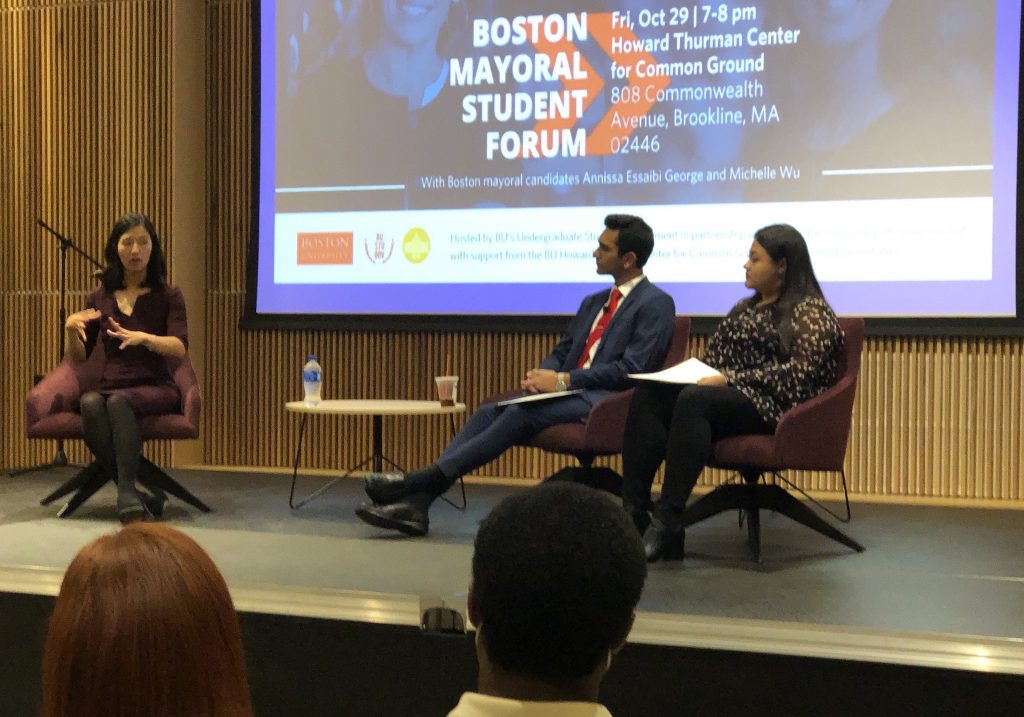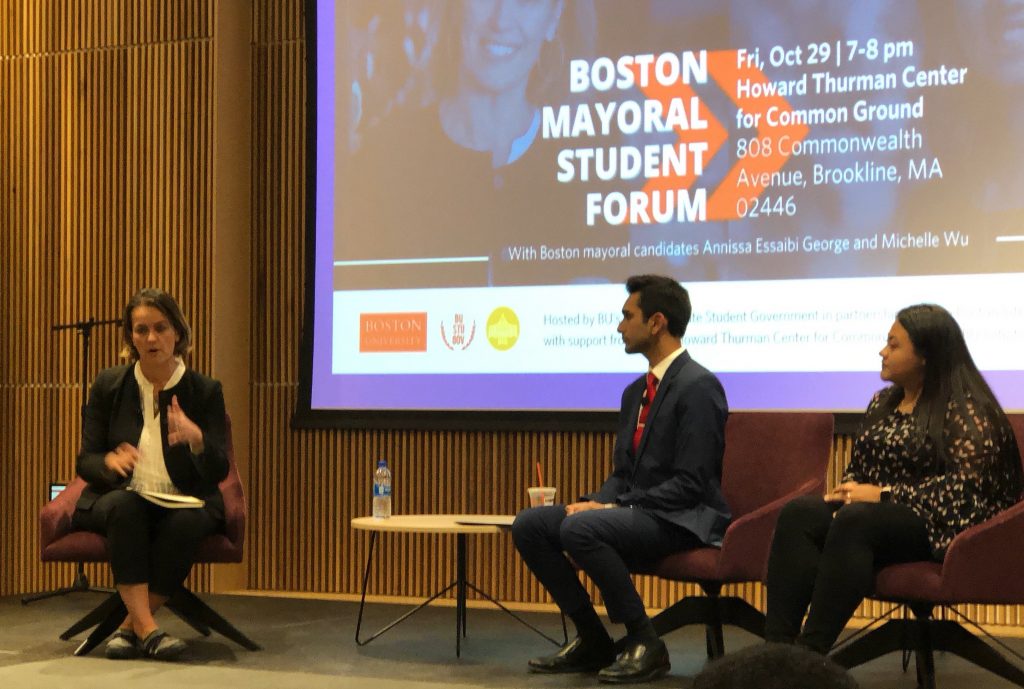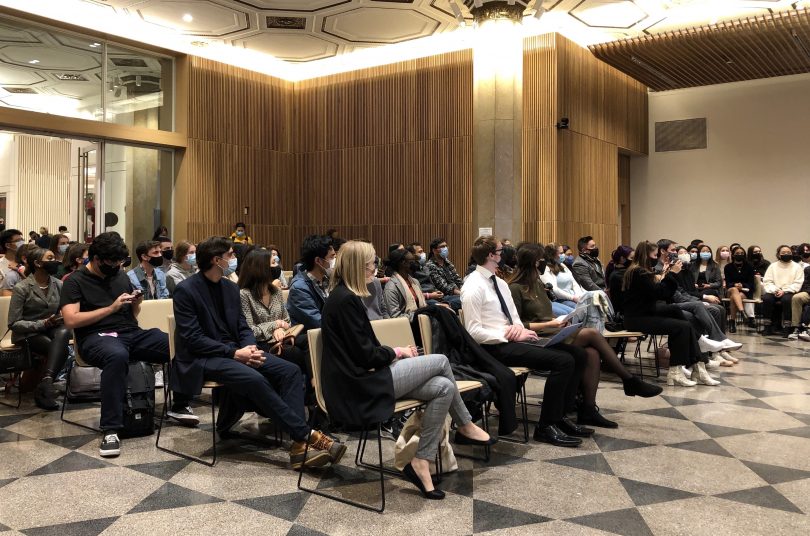By Artemis Huang
Boston University News Service
BOSTON – Boston’s historically diverse mayoral candidates shared their ideas for the city’s future days before Election Day, honing in on themes of equity in policy initiatives for housing, transportation and how to spend federal aid.
Candidates Annissa Essaibi George and Michelle Wu spoke at the Boston Mayoral Student Forum, at the Howard Thurman Center for Common Ground at Boston University on Friday.
Co-hosted by Boston University’s Undergraduate Student Government and the Boston Intercollegiate Government, the forum invited the two candidates to speak separately, answering questions from Boston’s student community.
Hessann Farooqi, executive vice president of Boston University Student Government, and Gabriela Ramirez, deputy director of City Affairs in the Boston University Student Government, served as the moderators of the event.
Both candidates acknowledged Boston is facing serious problems in housing affordability. Speaking on combating gentrification, Essaibi George recognized that 10% of current Boston public school students are struggling with homelessness.
She said the city should work with organizations like the Massachusetts Affordable Housing Alliance to help families with their first home purchases and down payments.
Wu added that in addition to creating affordable housing, the city should also implement rent control. If enacted, it would not be the first time the city of Boston has seen rent control. Back in the 1970s, cities across Massachusetts had bureaucracies that oversaw how much rent could be charged in different towns and cities.
The practice ended in 1994, after private landlords funded a statewide ballot initiative that passed with just over 50% of the vote. While Boston, Brookline and Cambridge voted to keep rent control, in 1994, the policy was prohibited in Massachusetts.

Wu further clarified that she is proposing a different way of rent control. Rather than setting the exact amount of rent for different districts, she intends to control the speed of rent increase to prevent people from being pushed out of their homes.
Referring to Oregon’s current rent control measures, which took effect in February of 2019, Wu said rent control has been successful at increasing housing stability while maintaining a healthy rental market. She intends to follow suit.
Addressing the homelessness crisis at Massachusetts Avenue and Melnea Cass Boulevard, Essaibi George pointed out that homelessness, addiction and mental illnesses often happen together. To address this multifaceted public health crisis, Essaibi George placed an emphasis on community effort, saying that the city government should work in partnership with other organizations and existing programs to bring those struggling into recovery programs.
Some recovery measures that Essaibi George supports include needle exchange programs, harm reduction, mental health support and addiction response models.
“I am interested in rebuilding a bridge to Long Island for long-term recovery and care,” Essaibi George said.
She hopes that those in need would be able to easily find assistance from local government officials.
Wu proposed three measures to tackle the problems of homelessness, substance use and mental illness. She said that affordable housing needs to be created by the city government on public property.
After getting people sheltered, the city also needs to have fair and accessible medical treatment for all citizens. In addition to shelter and treatment, Wu plans to create a new cabinet position that would report directly to the mayor on this crisis to increase accountability.
Boston received $560 million from the federal American Rescue Plan Act, a $1.9 trillion rescue package designed to facilitate the United States’ economic and health recovery from the COVID-19 pandemic.
When asked about how she would use this resource, Essaibi George focused on housing support, the opioid crisis and diversity-equity-inclusion initiatives. She emphasized that she would partner with people of color, disability, and LGBT communities in making plans to increase diversity, equity and inclusion in Boston.
She would also dedicate $100 million to the Black community, admitting that several Black community organizations helped her develop and draft her diversity and equity initiatives.

“I rolled out a couple of weeks ago a formal equity-inclusion-and-justice plan,” Essaibi George said. “I did it in partnership with our communities of color, with our disability community, with our LGBT community. And some of the work that came from that, came specifically from the black community.”
Wu focused on increasing housing stability, closing the racial wealth gap and planning for the future. She emphasized that the government should be making longer-term plans for sustainable development, and that Boston should be a leader in tackling issues such as climate change.
Wu also fielded questions about the fare free transit plan she touted on the campaign trail, citing some statistics about how the measure could save money.
According to Wu, if the subway is free, MBTA can save $29 million because buses would be moving faster, saving on fuel maintenance costs. Currently, the MBTA collects around $30 million in bus fares a year.
Wu also pointed out that the rising fare has caused ridership declines, which could undermine the MBTA’s efforts to regrow ridership to pre-pandemic levels. The MBTA saw a 69% decline in light rail ridership between 2019 and 2020, according to an analysis by the Pioneer Institute. Free public transit would not only make the MBTA accessible to all, but reduce traffic and improve air quality.
Participant Jeff Grundy from Emerson College said that he has been watching the two candidates’ social media strategies, and he was interested in the candidates’ policy proposals, but hasn’t been as impressed with Essaibi George’s recent campaign tactics.
“Seeing what the candidates do on social media and how they run their ads make me look into them harder,” Grundy said. “Essaibi George has been running a series of campaign ads claiming that Michelle Wu is going to defund the police. [Negative ads] scream desperation, and I don’t want to support a candidate who is that desperate to mudsling to that degree.”





